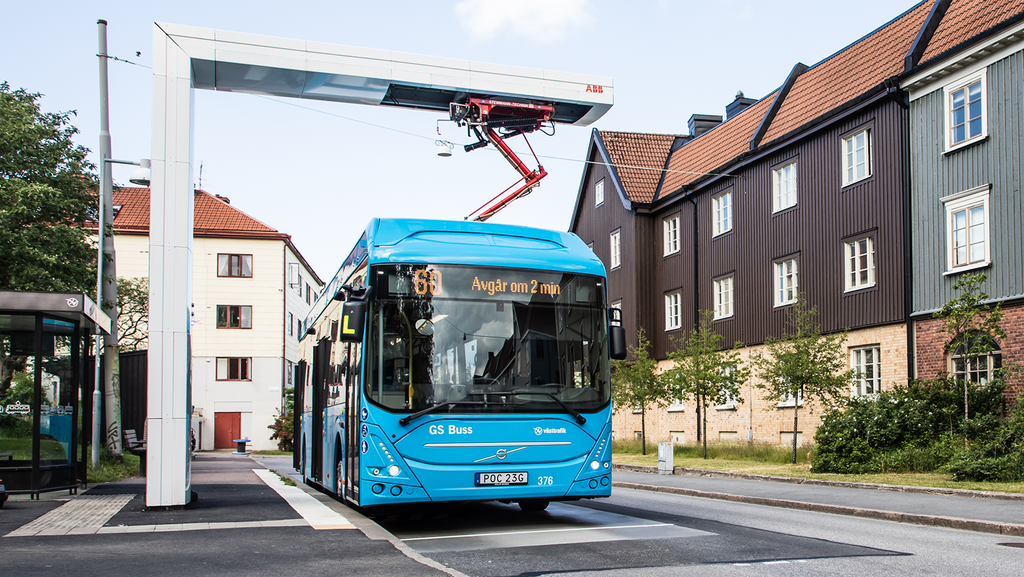New study: Electric buses contribute to better health for residents
Lower noise levels, better sleep and reduced fatigue and a sense of feeling low. These are some of the effects for the residents along route 60 in Gothenburg after the buses on the route were replaced by electric buses. This according to a new study initiated by the ElectriCity collaboration and carried out by the University of Gothenburg.

In the autumn of 2019, all buses on route 60 in Gothenburg were replaced by electric buses. The buses run in densely populated, partly very hilly areas and in the past the levels of low-frequency noise have been noticeable among the nearby residents.
The University of Gothenburg has now conducted a study to measure the noise inside the homes to see how it affects human health, before and after the electric buses were put into service.
The results show major improvements for those who live near the bus route. For example, the proportion who noticed noise from buses fell from 75 to 39 percent. The proportion that was disturbed to a very high degree was reduced from 26 to 5 percent.
"We can be disturbed by different sounds, but the issue with low-frequency noise is that it is attenuated to a lesser extent than high frequencies and therefore penetrates more easily into homes, even small increases are perceived as very noticeable", says Kerstin Persson Waye, Professor of Environmental Medicine at Sahlgrenska Academy at the University of Gothenburg and responsible for the study.
Clear health improvements
The perceived health effects of the electric buses were clear. Among those who lived closest to the route, the proportion who felt tired once or twice a week dropped from 49 to 39 percent. The proportion of those feeling low went from 22 to 17 percent. Significantly fewer also said they were very sleepy during the day.
"It is exciting to get concrete research results that show positive impacts by electric buses on human health and everyday life, not just on the climate. The foundation for this transition was laid in our pilots within ElectriCity, and has now been transformed into a large-scale electrification of our traffic. The cooperation and knowledge within our collaboration has accelerated this change, which is crucial for us to achieve our ambitious climate goals", says Hanna Björk, Head of Sustainability at Västtrafik.
The City of Gothenburg sees several positive effects of an increased proportion of electric vehicles in the city:
"When buses and other heavy vehicles become electrified, we get reduced noise levels and lower emissions of air pollutants, which contributes to more pleasant and healthier living environments in Gothenburg. Electrification also creates new opportunities for urban and traffic planning. The ElectriCity collaboration, enables opportunities for important knowledge-exchanges and swift forms of cooperation to accelerate this", says Peter Lindgren, ElectriCity Coordinator for ElectriCity at the Urban Traffic Administration.
The electrification of bus traffic in the Gothenburg area continues. 174 electric buses are currently running in Gothenburg, Mölndal and Partille and a total of 218 operate in Västra Götaland. During the summer of 2022, another 80 buses will be replaced by electric buses.
Read more about the study at the University of Gothenburg
Read more at Västtrafik
Read more at Volvo Buses
Facts about the study
- The study was conducted by the Department of Community Medicine and Public Health, Sound Environment and Health at the Department of Medicine, University of Gothenburg.
- The University of Gothenburg and RISE Sweden have measured noise levels indoors and outdoors in a selection of homes with different facades, a total of 15 apartments.
- Postal and web-based surveys were sent to a random sample of residents near and further from bus line 60 in Masthugget and Lunden, before and after the electric buses were launched.
- The study was part-financed by Västra Götalandsregionen.

